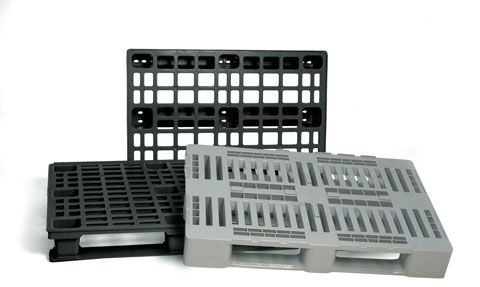Smart Pallets Enable Track-and-Trace with the Internet of Things
10 Mar 2017
For the food industry in particular, traceability of ingredients and of finished products is more important than ever. Add in environmental pressures to reduce the amount of packaging used and shipping represents some major challenges.
Fortunately, the latest technologies can help, allowing goods to be shipped safely and economically and to be tracked along the way.
Pallets and Automation
Traditional wooden pallets have been around for a long time, but they present a number of issues when it comes to the food industry. They can harbour contaminants and pests if not properly treated, and there’s a risk of splintered wood and nails getting into the product too.
With increasing levels of automation now being installed in warehouses, there’s also the issue of differences in size and weight of wooden pallets causing problems for automated handling systems. Ultimately, this can lead to damaged goods and consequent wastage or to delays in the handling process which have to be manually resolved.
It’s no surprise then that the plastic pallets market has taken off, providing pallets which are easier to clean, have a long service life and are also much more consistent in their sizing. This makes plastic pallets much more suited to use with automated warehousing systems.

Tracking Pallets
Traditionally, tracking and tracing pallets has involved technology like barcodes. While this is effective, it does mean that codes must be read at each stage of the logistics process and the labels need to be appropriately positioned. Newer radio tracking systems offer an effective approach, but with wooden pallets there’s the problem of attaching tags securely and keeping them safe from damage by moisture or rough handling.
A big advantage of plastic pallets is the ability to embed tracking technology in the pallet itself. Smart pallets can have radio frequency ID (RFID) tags embedded in them to allow them to be easily traced all the way through the supply chain.
These tracking systems can be expensive to implement, but since plastic pallets are robust and have a longer lifespan than the wooden variety, they last longer. This means the cost of ownership over the product life is more realistic. Plastic also means that the tagging equipment can be embedded into the pallet itself so that it’s safe from damage by rough handling and is protected from moisture when the pallets are cleaned.
Newer alternatives to RFID tagging include technologies like LTE-M, being pioneered by AT&T, which uses the existing mobile network to transmit information about pallet locations. This allows smart pallets to communicate directly with the Internet of Things so that it’s possible to track loads throughout the production process.
As well as for manufacturers, this is useful for businesses that rent out pallets, as they’re able to track their assets at all times, knowing where they are should they need to be recalled. Tracking information can be stored in the cloud so that it’s accessible to pallet owners, customers expecting deliveries and anyone else who needs it, allowing much greater flexibility in knowing where shipments are at all times.
